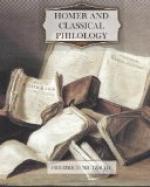The important problem referred to is the question of the personality of Homer.
We now meet everywhere with the firm opinion that the question of Homer’s personality is no longer timely, and that it is quite a different thing from the real “Homeric question.” It may be added that, for a given period—such as our present philological period, for example—the centre of discussion may be removed from the problem of the poet’s personality; for even now a painstaking experiment is being made to reconstruct the Homeric poems without the aid of personality, treating them as the work of several different persons. But if the centre of a scientific question is rightly seen to be where the swelling tide of new views has risen up, i.e. where individual scientific investigation comes into contact with the whole life of science and culture—if any one, in other words, indicates a historico-cultural valuation as the central point of the question, he must also, in the province of Homeric criticism, take his stand upon the question of personality as being the really fruitful oasis in the desert of the whole argument. For in Homer the modern world, I will not say has learnt, but has examined, a great historical point of view; and, even without now putting forward my own opinion as to whether this examination has been or can be happily carried out, it was at all events the first example of the application of that productive point of view. By it scholars learnt to recognise condensed beliefs in the apparently firm, immobile figures of the life of ancient peoples; by it they for the first time perceived the wonderful capability of the soul of a people to represent the conditions of its morals and beliefs in the form of a personality. When historical criticism has confidently seized upon this method of evaporating apparently concrete personalities, it is permissible to point to the first experiment as an important event in the history of sciences, without considering whether it was successful in this instance or not.




